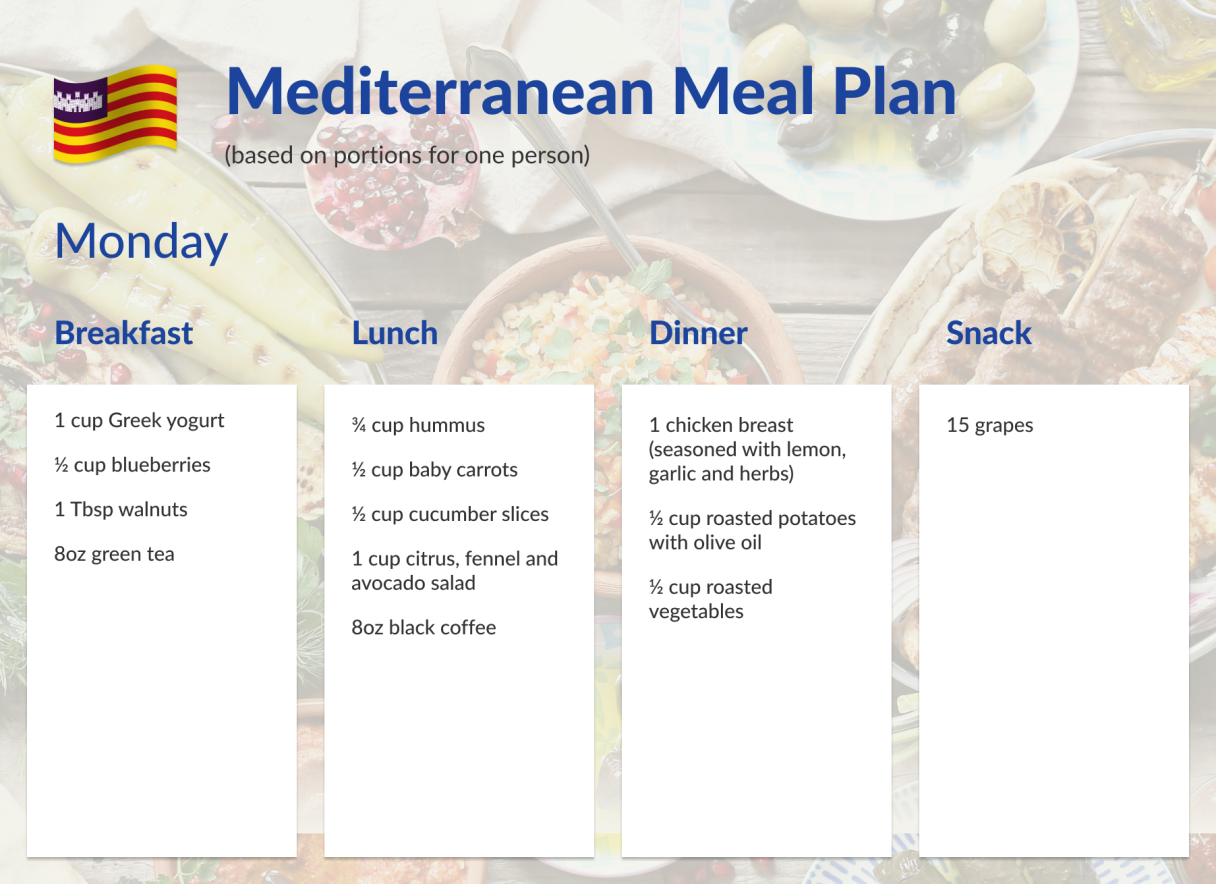
Meal Plan Created By: Amanda Kostro Miller
What is the Mediterranean Diet?
For decades, the Mediterranean diet has been praised for its multiple health benefits. Unlike other cuisines we’ve featured, “Mediterranean diet” doesn’t refer to one specific country - instead, it refers to the cuisine of countries bordering the Mediterranean Sea (like Greece, Crete, Italy). Research conducted in the mid-1900s showed that these countries had some of the lowest rates of chronic diseases in the world, despite limited access to healthcare.1 Since then, the Mediterranean diet has gained popularity around the world. To bring the Mediterranean diet (and the many benefits it offers) to you, we’ve partnered with a Registered Dietician to create an authentic and delicious week-long Mediterranean meal plan. Once you download the plan, read on to learn the health benefits of this unique diet!
Download The Printable Meal Plan
Health Benefits of Mediterranean Food
Plant-Based Meals
One of the most studied diets for supporting cardiovascular health is the Mediterranean diet. This cuisine is heavily plant-based and built on a strong foundation of vegetables, fruits, nuts, herbs, and whole grains. Poultry, fish, beans, and eggs make up the diet’s main protein sources, and red meat is only occasionally eaten.2 Research consistently shows that this type of diet has some major heart-health benefits. Research consistently shows that this type of diet has some major heart-health benefits and is associated with reduced risk of cardiovascular disease. In one study, the Mediterranean diet supplemented with extra virgin olive oil or nuts was associated with a lower risk of cardiovascular events over a period of five years, compared to a regular low fat diet. Better adherence to the Mediterranean diet was associated with decreased rates of cardiovascular events.3
Read More: Heart Healthy Diet Essentials
Healthy Fats
This cuisine is full of healthy fats from olive oil, nuts, seeds, and fatty fish (including mackerel, herring, sardines, and salmon). Many of these sources are rich in omega-3 fatty acids, including DHA, which may help reduce inflammation and decrease the risk of cardiovascular disease.2 In addition to supporting your physical health, several studies have linked higher omega-3 intake with a decreased risk of age-related cognitive decline, although more research is needed to fully understand how this nutrient affects brain health.4 5 6
Whole Grains
The Mediterranean diet is full of whole grains like farro, bulgar, barley, and whole wheat or whole grain bread. The health benefits of whole grains, which provide dietary fiber, are numerous. A diet that incorporates more whole grains and reduces intake of processed grains is associated with a lowered risk of heart disease, stroke, obesity, and type 2 diabetes.7 8 9 10
Heart-Healthy Mediterranean Recipes

Our free, 7-day meal plan incorporates a variety of authentic Mediterranean dishes. From naturally sweet farro fruit salad to classic Mediterranean bowls, you can savor three delicious and heart-healthy meals per day. Created by an experienced Registered Dietitian, you’ll enjoy a week’s worth of stress-free meal planning that’s good for your health and taste buds.
References
1 https://www.hsph.harvard.edu/nutritionsource/healthy-weight/diet-reviews/mediterranean-diet/
2 https://www.mayoclinic.org/healthy-lifestyle/nutrition-and-healthy-eating/in-depth/mediterranean-diet/art-20047801
3 https://www.nejm.org/doi/10.1056/NEJMoa1800389?url_ver=Z39.88-2003&rfr_id=ori%3Arid%3Acrossref.org&rfr_dat=cr_pub++0www.ncbi.nlm.nih.gov
4 https://pubmed.ncbi.nlm.nih.gov/19262590/
5 https://pubmed.ncbi.nlm.nih.gov/19523795/
6 https://pubmed.ncbi.nlm.nih.gov/25592004/
7 https://pubmed.ncbi.nlm.nih.gov/27301975/
8 https://pubmed.ncbi.nlm.nih.gov/26629253/
9 https://pubmed.ncbi.nlm.nih.gov/23803885/
10 https://pubmed.ncbi.nlm.nih.gov/24158434/












